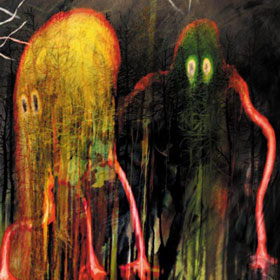The King of Limbs by Radiohead

5/5
Note: Review revised 2/21/11 at author's request
Radiohead continually prove themselves to be the Thomas Alva Edisons of pop music. The deceptively democratic "pay-what-you-will" digital release of 2007's In Rainbows actually served to boost sales for an elaborate, pricey physical "discbox" edition of the album unleashed on the market a few months later. In a relatively brief span of time, the band effectively established themselves as radical opponents of capitalism, a reputation which surely motivated a great number of people to shell out $80 for a dubious incentive item, for which the band are now all the richer. That In Rainbows was probably the third or fourth best album the band ever released may have helped along the chances, but Radiohead may also be acutely aware of their branding power: after all, they no longer require a record label for anything other than distributing their self-promoted "inventions"; they have a massive core fan-base and every album they've released, save Amnesiac and, for obvious reasons, In Rainbows, has obtained Platinum status in either in this country or their own. For The King of Limbs, Radiohead offer a fixed but reasonably priced digital edition in 320 kbps MP3 or lossless WAV format, with a special "newspaper edition," which will consist of two clear vinyl discs, 625 individual pieces of artwork and a oxo biodegradable plastic binder to contain them, to be released later this year. Added to which, the existence of the impending record and its marketing scheme was announced less than one week before its release, and then the digital album was pushed forward one whole day.
While In Rainbows came to be regarded by many fans and members of the music press as mildly retractive of the group's flirtations with electronica, and — perhaps because it featured a OK Computer era outtake: "Nude" — a leap backwards to their pre-Kid A production aesthetic, The King of Limbs is a full-fledged return to, and in many respects a perfection of, the indie electronic aesthetic perhaps best exemplified by Hail to the Thief: in a sense, a continuation of the work left off before In Rainbows. Speaking to this retraction is the album's opening track, "Bloom": beginning with a gentle, shimmering, delay-processed piano loop, the band proceeds to lay on dense tactile synths and backwards drum samples before introducing the song's principal rhythm pattern: a stuttering, frantic, bar-length drum loop, falling, in terms of style, somewhere between Tito Puente and The Streets, oddly enough. The average listener will not immediately discern a structure until the introduction of an all low-end bass line cribbed directly from some unreleased Roni Size track, but then further confusing his or her vain search for obvious meaning will be the monotonous chanting of Thom Yorke. "Bloom" is as far from a pop song as anything Radiohead have ever recorded, and for this reason it constitutes something of a parallel high water mark for the band: while the electronic "experiments" of Amnesiac and Hail to the Thief were often devoid of emotion or felt like trendy affectations and little else, here the band have arrived at their "eureeka" moment of how best to integrate the dramatic tensions of the their best work into this, for them, new and unusual medium.
The not entirely dissimilar "Morning Mr Magpie" reintroduces the band's oft-shunned guitars but maintains the loose "raga" structure of the previous track: the band implements no (obvious) sequence changes save for a ghostly, percussionless middle eight section. The closest comparison to a previous song would be that of "The National Anthem," with bouncy muted guitar patterns here serving a function similar to the ominous fuzz bassline of the older song: that of a skeletal frame upon which to weave a mess of free floating Radiohead melody-tropes and eerie, schizoid soundscapes. Superficially, "Little By Little" may be one of the more conventional songs on the album, but it employs some unusual means to a tightly structured end: even more unsettling than its skittish, vaguely middle eastern-sounding drum patterns and an unusually strained and tortured sounding performance by Thom Yorke are the faintly audible and irritatingly upper register backmasked guitars (I think) peppered throughout the mix; the result is one of the grimmest, most menacing statements the group have ever made. Following this is a dub-step influenced track, which does that genre some justice, replete with manipulated vocals, a liberal use of delay processing and disappearing/reappearing drum, bass and vocal samples.
"Lotus Flower" is the most obvious choice for a lead single: at least from a compositional standpoint, the most "familiar"-sounding, largely based around blues changes, one of the best tracks on the album, and surely, along with “House of Cards,” one of the more romantic songs the band have ever recorded; a prime example of their latest synthesis of genres—adult contemporary and 2-step—and perhaps the moment where Radiohead finally figured out how to pull off drum-grooves and fills with a pattern sequencer. "Codex" is, if you like, the "Videotape" of The King of Limbs: the album's default "weepy." Though it is during moments like these that Radiohead veer a little too close to sentimentality, the listener's interest is sustained by a rich, detailed arrangement of intendedly warm and muted colors. "Give up the Ghost" is another highlight: what may be a loop of Yorke singing "don't haunt me" repeats for its entire five minute duration, to which are added layer upon layer of heavily distorted vocal samples resembling brass instruments, all of which lend harmonic complexity to an otherwise simple vocal melody and guitar/bass arrangement. "Separator," while not the album's best track, may be its only upbeat moment, featuring a chirpy vocal by Yorke, and bright exultant alto guitars over a playfully funky rhythm arrangement.
RELATED ARTICLES
Get the most-revealing celebrity conversations with the uInterview podcast!





Leave a comment